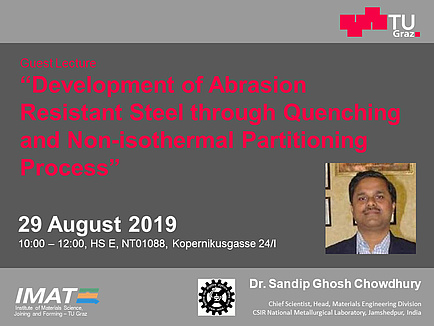Development of Abrasion Resistant Steel through Quenching & Non-isothermal Partitioning Process
Guestlecture – Dr. Sandip Ghosh Chowdhury
Art
- Vortrag
Themenbereich
- Advanced Materials Science (Field of Expertise)
- Mobility & Production (Field of Expertise)
In the present investigation, an attempt has been made to stabilize austenite by carbon partitioning through quenching and nonisothermal partitioning (Q&P) technique. This will eliminate the need for additional heat-treatment facility to perform isothermal partitioning or tempering process. The presence of retained austenite in the microstructure helps in increasing the toughness, which in turn is expected to improve the abrasion resistance of steels. The carbon partitioning from different quench temperatures has been performed on two different alloys, with low-Si content (0.5 wt pct), in a salt bath furnace atmosphere, the cooling profile of which closely resembles the industrially produced hot-rolled coil cooling. The results show that the stabilization of retained austenite is possible and gives rise to increased work hardening, better impact toughness and abrasive wear loss comparable to that of a fully martensitic microstructure.
Veranstaltet von
TU Graz | Institute of Materials Science, Joining and Forming (IMAT)
Zeit und Ort
29. August 2019, 10:00 - 12:00
TU Graz, New Campus, Hörsaal E, NT01088, Kopernikusgasse 24/I, 8010 Graz, Austria
Zusatzinformationen
Abhaltungssprache: Englisch
Kontakt
Sandra WESENER
TU Graz | Instiute of Materials Science, Joining and Forming
sandra.wesener@tugraz.at
Tel.: +43 316 873 7181


